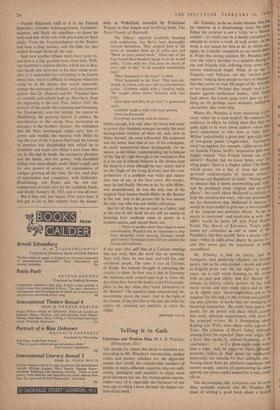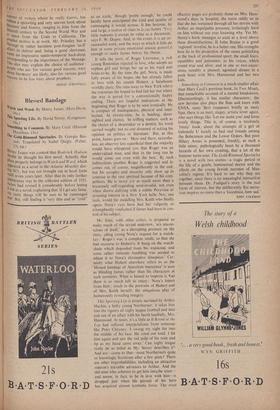Telling it in Gath
Literature and Western Man. By J. B. Priestley. (Heinemann, 42s.)
THE people for whom this book is intended are, according to Mr. Priestley's introduction, neither critics and literary scholars nor the digest-fed masses but 'chiefly the considerable numbers of people, in many different countries, who are suffi- ciently intelligent and sensitive to enjoy most good literature but are, for various good reasons, rather wary of it, especially the literature of our own age to which I have devoted the largest sec- tion of this book.' Mr. Priestley, as he no doubt intends, thus has his reviewer at a disadvantage from the stars Either the reviewer is not a 'critic' or a 'literary scholar'—in which case he is hardly competent ta attempt to review a work of such sco work is not meant for him at all, in which s again, he is hardly competent to say much bo it. From this strong position Mr. Pr a over the critic's shoulder to a putative throng 01 shy and friendly folk suffering from on lYs terious intellectual blight. What, in an age Penguins and Pelicans, are the 'various go°
reasons' making these people so y o i tt
war espfsueti recthiyeeahoraartn I., hi kouricest:i that they prefer to read 500 pages of Mr. PriestleY at two guineas? Perhaps they simply need a de- fender against intellectual bullies : with Uncle Jack about, the Leavis gang won't dare try anY thing on. Or perhaps, more seriously, baffled IV obscurities, they want help.
Where Mr. Priestley is most reassuring is Pre' cisely where he is least helpful. He reassures his audience, in effect, by telling them that they are quite right to be wary about authors whom theY don't understand or who bore or repel theta. Milton 'undoubtedly a great poet' gets eight lines of low-grade praise ('organ-voice,' fascinating verse') as against, for example, eighty-seven lilies on Anatole France. Swift's `stupendous gifts were largely wasted.' Our French friends ask us t° admire'—Racine, but we know better, over to, smug pages. There is a chapter called 'The Poets, which quotes not .a line of verse but awards personal conduct-marks to various writers-- Whitman and Baudelaire do badly. 'Among noue,11 so obscure that it seems unrewarding and repel- lent he produced some original and powerful effects'—this truth about Mallarme is unlikely 1'1 help the sensitive-but-wary, who can presumablY see for themselves that Mallarme is obscure; it would be more useful to give one or two examples of his 'original and powerful effects.' As far as poetry is concerned—and. much else as well—the SBWs would be better off with Ford Mado% Ford's The Marc'h of :Litera ture. Ford's judg" ments are sometimes as odd as some of Mr' Priestley's, but they usually have a precise refer' ence —when he talks 'about poetry he quotes it' and they never give the impression of being secondhand. .
Mr. Priestley is bad on poetry, bad un foreigners, . and positively offensive on foreign poetry, but on his own ground – novels and plaYs in English prose over the last eighty or ninetY years—he is well worth listening to. He writes with an ease' and clarity that few literary his' torians, or literary critic's, possess; he has read many novels and seen many Plays and he has as he rightly says, 'much :experience, .not to be despised fOr this task;of the writing and publish: ing and criticism of books and the managing 0' theatrical enterprises.' He could have added, 11° doubt, for the period and place which interest him most, personal acquaintance with most of the principal writers. He is illuminating about Kipling and Wells, even about some aspects of Yeats. His criticism of Henry James. although coming from the expected 'plain man' angle, has a force that carries it. without brashness, to its conclusion; 1 . as if a ghost might write better than a man.' And his pages" onShaw; 'although probably unfair. in ,.their. stress on intellectual dishonesty, are valuable for their sidelights, like: 'having learnt from his platform experience that earnest people, capable of appreciating his ideas and wit, are always easil)l. amused by broad, comic effects. . .
The discouraging title, Literature and Western Men. probably explairis why' Mr. Priestley, i f stead of writing. a good book about a limited niiriTher 01 writers whom he really knows, has ritten a sprawling and very uneven book about i!terature and history, ranging in_time from the !Ifteerah century to the Second World War and space from the Urals to California. The Z°Phet motive is at work. Mr. Priestley has a
"sage (a rather harmless post-Jungian 'as-if' affair) to deliver and, being .a good showman. Mints an impressive spatio-temporal back-drop,
responding to the importance of the Message. Ink also may explain the choice of audience: Pe°Ple who are 'for various good reasons, wary 'thou( literature' arc likely, also for various good reasons. to be less wary about prophets.
DONA] O'DONNELL



































 Previous page
Previous page